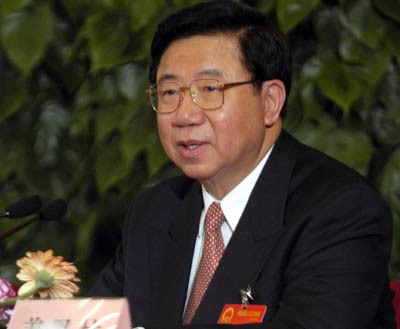The proposed anti-secession law, which will be deliberated by China's top legislature, the National People's Congress (NPC), at its upcoming annual full session, is by no means a so-called "law on the use of force against Taiwan", nor a so-called "war mobilization order", a spokesman for the NPC session said Friday.
"On the contrary, this is a law which will promote the development of cross-Straits relations and promote peaceful reunification," said Jiang Enzhu at a pre-session press conference held in the Great Hall of the People in downtown Beijing Friday morning.

Jiang Enzhu speaks at the press conference. [newsphoto]
The law will reaffirm the Chinese government's adherence to the basic principle of peaceful reunification and "one country, two systems" and its eight proposals regarding the development of cross-Straits relations and promotion of the motherland's peaceful reunification, said Jiang.
It will also clarify and consolidate, in the form of law, the Chinese government's policy stand on developing cross-Straits relations, promoting the direct links of trade, mail, and air and shipping services across the Straits, and protecting the legitimate rights and interests of the Taiwan compatriots, as wellas on cross-Straits consultation and talks on the basis of the one-China principle, Jiang added.
"The law will manifest the common will of the entire Chinese people to safeguard national sovereignty and territorial integrity, as well as their zero tolerance toward any attempt by the 'Taiwan independence' secessionist forces to make Taiwan secede from Chinaunder any name and by any means," he said.
"It is a law for opposing and checking Taiwan's secession from China by secessionists in the name of 'Taiwan independence' and for maintaining peace and stability in the Taiwan Straits, and a law for safeguarding national sovereignty and territorial integrity which is in the fundamental interests of the Chinese nation," he added.
NPC proposes $30 bln military spending for 2005
The State Council, China's cabinet, has proposed the NPC to approve a 247.7 billion yuan (29.8 billion US dollars) national defense budget for the year 2005, Jiang said.
"This is still a fairly small amount compared with (the military spending) of other major countries in the world, in terms of its proportion to China's total financial expenditures and gross national product," said Jiang.
The budgeted money will be mainly used for the raise of paymentand social security guarantee for the servicemen, the arrangement of officers and soldiers discharged in China's latest move to cut its troops by 200,000, and the military's armament upgrading to promote the modernization of China's national defense, Jiang said.
Jiang Zemin requests resignation from remaining post
Jiang Zemin, 78, requested to resign from his remaining post as chairman of the State Central Military Commission (CMC) in a letter read Friday to a presidium meeting of the National People's Congress, China's parliament.
The presidium adopted a draft resolution to accept Jiang's request, and decided to submit the resolution for deliberation at the upcoming 3rd session of the NPC.
Jiang resigned from the chairmanship of the Central Military Commission of the Communist Party of China (CPC) last September, and was succeeded by Hu Jintao.
The parliament session will elect a new chairman of the State Central Military Commission, according to an agenda adopted at a preparatory meeting of the session Friday.
Hu Jintao, also general secretary of the CPC Central Committee, is expected to succeed Jiang as chairman of the State Central Military Commission.
Jiang became chairman of the CMC of the CPC in November 1989, and chairman of the State CMC in 1990.
In 2002, Hu Jintao succeeded him as general secretary of the CPC Central Committee. Hu became Chinese president in 2003.
Also on Friday, the preparatory conference of the NPC session elected a 173-people presidium and a secretary general.
Approximately 3,000 members of the parliament will also hear and review the government work report to be delivered by Premier Wen Jiabao on the opening day of the session.
Another important agenda of the session will be the deliberation of the anti-secession law. |

